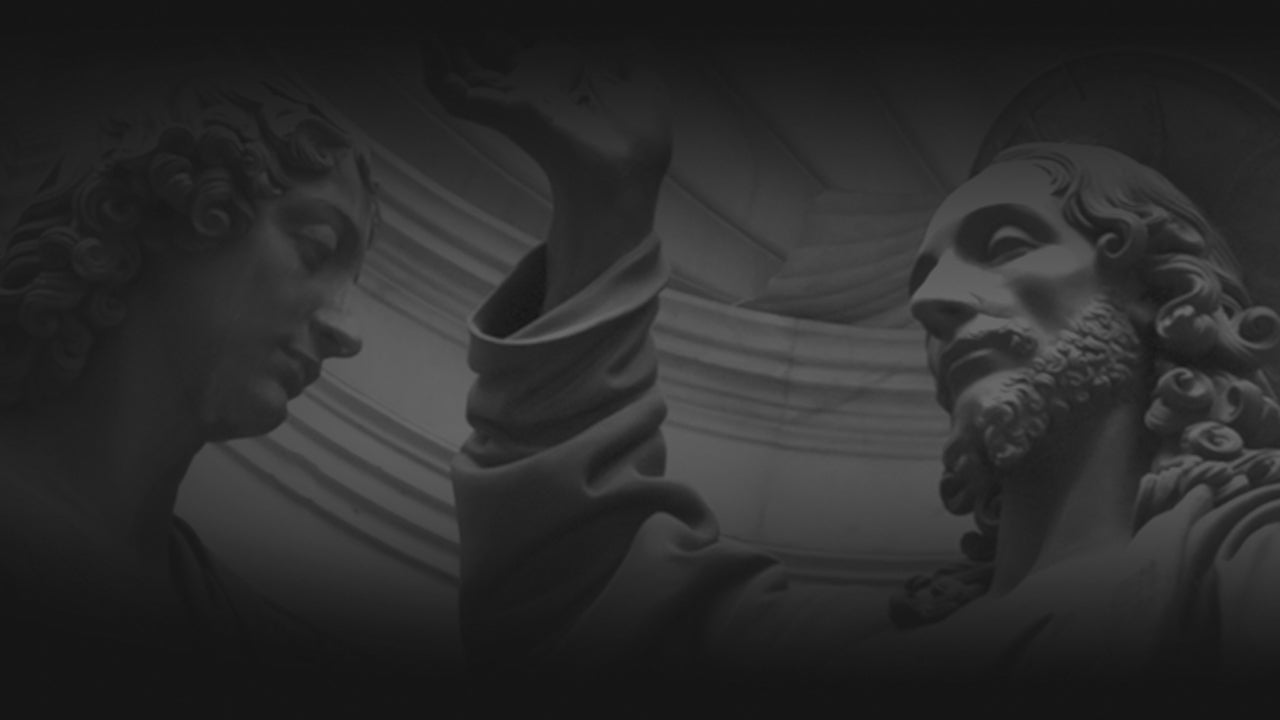
Philosophy & Religion
Theology 101: The Western Theological Tradition
10 lessons
8h total length
Create Your Account to Get Instant Access to “Theology 101: The Western Theological Tradition”
Examine the eternal truths of Western theology from Genesis to today.
Lessons in this course

31:13
lesson 1
Theology at Hillsdale College
The English word theology is rooted in the Greek words for God (theos) and reason or speech (logos). The gift of speech or reason, given by God to man, enables us to think about God and to worship Him. One of the chief aims of the liberal arts and their study at Hillsdale College is to understand what kind of being man is, as well as his purpose, which in turn makes it possible to begin to understand man’s relationship to God.

41:59
lesson 2
The God of Grace in Judaism and the Hebrew Bible
The vision of God in Judaism and its scriptures represents a revolutionary view of God, Who creates humans to be the recipients of His divine benefits without any expectation of entitlement. In other words, the God of the Bible is a God of grace. This understanding is expressed remarkably consistently throughout the history of covenants God makes with His chosen people. This view of God has had an important effect on our attitude toward other people and on the unique Western idea of the proper role of government.

38:57
lesson 3
The God of Grace in Christianity and the New Testament
God’s covenant with David of the Hebrew Bible is fulfilled by Jesus Christ, the Messiah. The Gospel of Mark, which eloquently defends the messianic mission of Jesus Christ, argues that Christ’s suffering and death qualify Him as the fulfillment of the Davidic hope and for the central role in God’s history of salvation. Mark’s defense lays a sturdy biblical foundation for the doctrines of orthodox Christology that the church faithfully enshrined in its creeds over the course of the following centuries.

38:36
lesson 4
God and Grace in Trinitarian Controversy
The fourth century Trinitarian controversy focused on the relationship between the Father and the Son, both of Whom were called God by Christian monotheists. What does it mean for one’s understanding of the divine nature that the Son had taken flesh, died, and risen for the sake of humanity? The controversy is a moment of particularly intense struggle to establish a common language by which to state the mystery of faith without distortion, and in a manner that would do justice to the God of Christian worship.

32:08
lesson 5
The Life of Grace and the Pelagian Controversy
In the fifth century, Pelagius sought to inspire moral reform among Christians. He began preaching a stoicized Christianity, in which one’s freely-willed attainment of a habitual moral perfection would gain divine favor and, with it, admission to heaven. The gracious gifts by which God had made this possible were His commands and His example. On the other hand, Augustine of Hippo saw Pelagius as abandoning apostolic tradition by removing God from Christian life. Augustine argued that the path to heaven was not mere imitation of God’s commands. Rather, a participation in the life of the Trinity, impossible apart from divine aid, was the God-given grace that defined Christian life and related this world to the next.

30:02
lesson 6
Thomas Aquinas on Nature, Grace and Life in God
In his teaching on grace, thirteenth-century theologian Thomas Aquinas reflects especially on the Christian’s participation in God’s life by the “love of God poured forth in our hearts by the Holy Spirit” (Rom. 5:5). Aquinas argues that while this life of love is an activity of human nature, it occurs nonetheless by a divinely wrought transformation: a grace of healing and elevating by which grace the Christian may be said to share in a communion of love with God on His terms.

30:32
lesson 7
Martin Luther on Justification
The Protestant Reformation began when German theologian Martin Luther (1483-1546) nailed his 95 theses on the church door at Wittenberg. Luther believed that justification comes by faith alone. For Luther, good works do not earn a place with God, rather, good works are a natural product of the believer’s love for God.

31:34
lesson 8
The Council of Trent on Justification
In response to the Protestant Reformation, the Roman Catholic Church convened a council at Trent in an effort to work out differences with reformers and to define Catholic doctrine clearly. Martin Luther and his followers argued that justification—a major topic of deliberation at the Council—is based on Christ’s personal righteousness alone. By contrast, the Council declared that justification also includes the righteousness Christ works in and through believers.

37:00
lesson 9
Christianity and the Enlightenment
The Enlightenment’s elevation of reason and diminution of traditional authority posed challenges and presented opportunities to Christianity. The Christian response to the Enlightenment locates the mystery of humanity in the mysterious nature of the Creator of the universe in Whose image man is made.

55:47
lesson 10
Knowing God in the Twentieth Century
Classical Christianity saw theology as the pursuit of understanding God’s self-revelation in history, a self-revelation that reframed human nature and experience. Contrary to this idea, modern thought focuses on human experience as the inescapable context—and sometimes the horizon—of human knowledge. In response, some theologians considered God to be merely a constitutive element of universal human experience, others sought to retain God’s ultimate transcendence.
Enroll in "Theology 101: the Western Theological Tradition" by clicking the button below.
What Current Students Are Saying
Takes the student through the full context of the course subject matter. Wonderful insight into how we strayed and its consequences and offers a solution.
Create your FREE account today!
All you need to access our courses and start learning today is your email address.